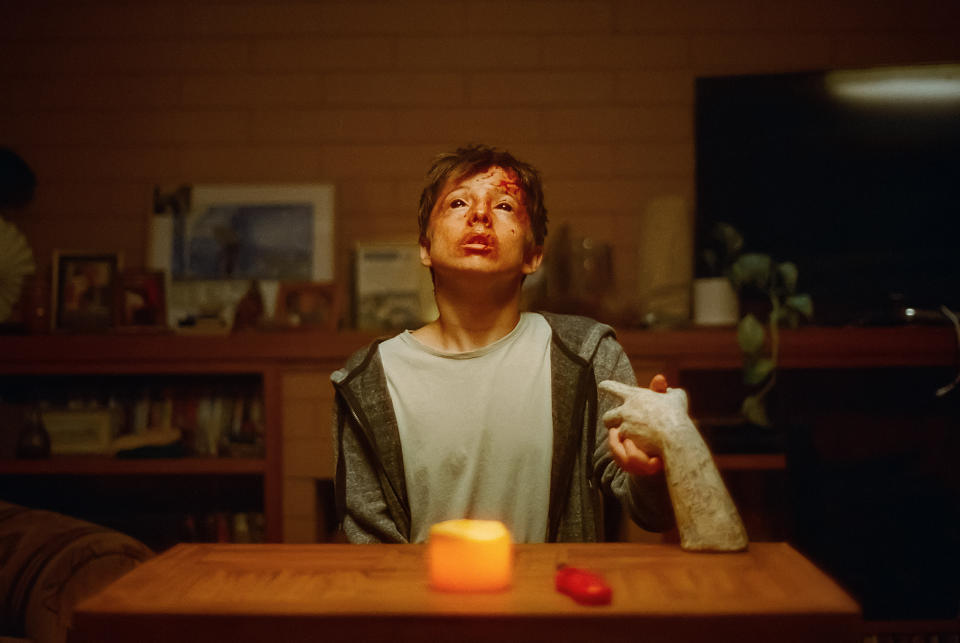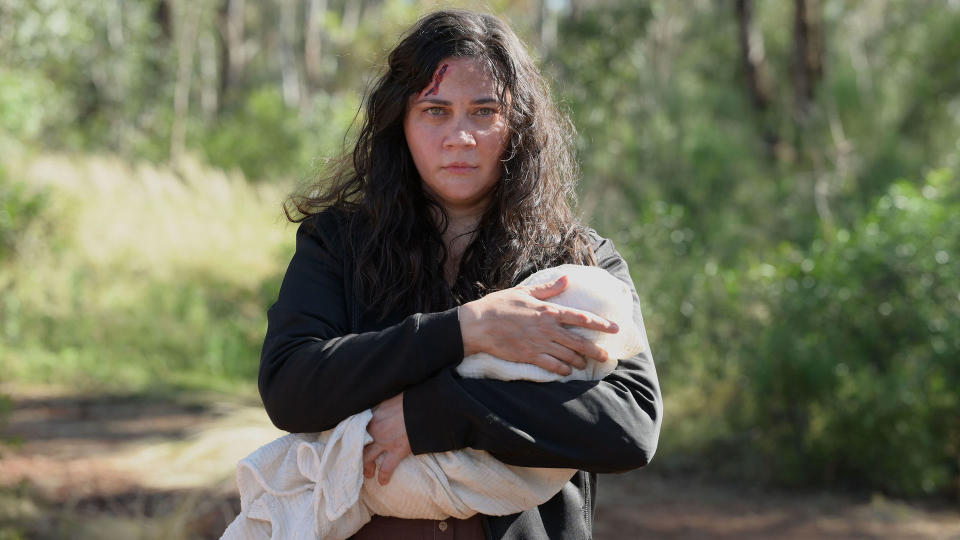4 Factors Weighing on the Sundance 2024 Market, from Netflix to the Actors Strike

What was the biggest story at Sundance last year? That’s easy: when “CODA” sold big in 2021 and went on to win Best Picture in 2022. Would that happen in 2023? It didn’t, and what did happen at last year’s festival and what it means for the market in Park City in 2024 is now harder to pin down.
It might be the story of “Fair Play,” which sold to Netflix for $20 million and was the biggest sale in a market that also included aggressive bidding wars for “Flora and Son” (Apple) and “Theater Camp” (Searchlight). It could be the tale of “Talk to Me,” which A24 knew how to market into a $92 million worldwide box office hit when nothing else that premiered at the festival gained nearly the same box office traction. Or it could be that Lily Gladstone is taking time out of the Oscar circuit to hype “Fancy Dance,” a buzzy sales title that still doesn’t have a home.
More from IndieWire
Because of the writers and actors strikes, a theatrical market that’s still in flux, and contracting budgets and mandates across the industry, we had a harder time in 2024 defining the one trend that will shape the market. Still, there’s a lot weighing heavily on it. These are the big factors that jumped out in over a dozen conversations with agents, producers, distributors, and studio executives.

The Indies Weren’t As Impacted by the Strikes as the Studios
A24 has three movies coming into this year’s Sundance: “A Different Man,” “I Saw the TV Glow,” and “Love Lies Bleeding.” Neon has three of its own, “Stress Positions,” “Handling the Undead,” and “Seeking Mavis Beacon.” Bleecker Street has “Sasquatch Sunset” at the festival and has 11 films on its 2024 slate, its most in a single year.
If you assumed the WGA and SAG-AFTRA strikes were going to decimate the lineup, think again. Sundance has a slimmer programming slate this year, but not for lack of submissions, which the festival said hit an all-time high at over 17,000 submitted movies. While it’s not true for Focus Features, Searchlight, or Sony Pictures Classics, indies like A24, Neon, and Bleecker were not AMPTP signatories and were able to secure interim agreements for films, meaning those most active on the Sundance market are arriving with full slates.
Agents believe distributors are still hungry regardless, especially for the right movie. If A24 can find another “Talk to Me,” they’ll jump on it. But that’s not to say indies weren’t impacted or that they won’t buy.
“We are going to feel the effects of the strike more in 2025, so it will be interesting to see the number of films in the marketplace – both independent and studio fare,” Kent Sanderson, president of acquisitions and ancillary distribution with Bleecker Street, said. “A lot of indie studios would have wanted to have more films going into production in the first half of this year, and that has been challenged, as there was almost nothing packaged in time for the AFM this year.”
The writers strike meant you couldn’t start scripts, and the actors strike meant you couldn’t start attaching talent. So while some movies couldn’t finish on time for Sundance, the real impact is to the packaging markets at AFM and Berlin. The studios and streamers felt that pain even worse, so it should leave the door open for companies to be aggressive if the quality is there.
“From the distributors I’ve spoken to, there’s an excitement around completed films because slates have been slowed, so I hope that the market is embracing it, but I have no crystal ball on this one,” said Michael Sugar of Sugar23, which is screening Steven Soderbergh’s “Presence.” “Indie film generally is at a disadvantage to where it was 10-15 years ago, but I think it also creates more space for the outliers.”
One executive with two films in the festival was less bullish. “It’s just a tough time in the marketplace overall because coming out of the strikes, I think everybody in all facets of the business is feeling some pain,” he said. “The ad sales market is still challenged for my ad-sales oriented clients. So I don’t feel like it’s necessarily a gold rush period.”

The Industry Needs Netflix to Be Serious About Licensing
It’s possible that the biggest impact on Sundance aren’t the strikes, but “Suits.”
We’ve spent a lot of time wondering why smaller distributors don’t take a chance on a movie after the big streamers have passed. But for true indies, the reality is they can’t buy a movie unless they have somewhere to put it.
Several agents and distributors explained one growing concern is indie distributors, particularly those without Pay 1, streaming output deals to release their films after they’ve played in theaters, depend on the backing from a streamer to inform their offers on a film.
“The value of that Pay 1 window has fallen away. That was always the security blanket,” said Bankside Films co-founder Stephen Kelliher, who is behind Midnight film “The Moogai.”
As one agent explained, it used to be that a smaller, boutique distributor could expect to get six figures in a licensing fee from an SVOD distributor down the road, and that would enable them to come to the table with a higher offer. This is less a problem for A24, which has a new output deal with Max, as does Neon through Hulu and Bleecker through Paramount+ with Showtime. But that middle class of distributor that makes its business on smart acquisitions, creating buzz for awards, and hoping for good box office, they need the Pay 1 window to fall back on.
“These companies can’t afford to take that many swings and misses,” the agent said. “The risk proposition was a lot different when you knew you had a guarantee you would make most of your expenses and most of your outlay back through SVOD and TVOD. Now they don’t have that guarantee anymore.”
Other agents agreed it has a real effect. As streamers have tightened their belts and slashed budgets, it’s meant less money for licensing. If a sales title has a $2 million budget, but the best a buyer can do is a straight distribution deal on a limited number of screens, a deal like that is “hard to fathom,” one said.
But the “Suits” effect is real, and so goes Netflix, so too does the rest of the industry. Producers, distributors, and agents alike are hopeful the tide is shifting within the last six months. That could have a big effect on what’s bought out of Sundance and beyond.
“I am hopeful it’s coming back. The way that Netflix has been pitching themselves in the press recently is that they are licensing material again. And I’ve seen it’s starting to happen,” one acquisitions head from a boutique distributor said. “Output deals are kind of the way of the past. There’s still some of them, but for a company like us who doesn’t have one, one of the things that we find is that if Netflix is licensing again in a real capacity, then Hulu might step up their game as well, as well as Amazon and everyone else.”
The studio executive agreed and said the whole streaming space is beginning to recognize movies are “really good values.”
“License fees for Pay 1 movies have increased. The marketplace is saying these are working as opposed to saying we’ve been paying too much for these,” the executive said. “All the platforms see value in movies. That’s a big economic piece of the puzzle. That’s why they all come to the film festivals. You can do really well if you find a good indie film.”

Creating a Dedicated Audience Is Getting Harder
One complicating factor that no one is talking about is Cannes, Toronto, and other fall film festivals are increasingly shying away from any movie that previously had its world premiere elsewhere.
When a movie is bought for seven or eight figures out of Sundance, it generates headlines and buzz, but what happens after that? As one distributor explained to us, for years, sales like that depended on other festivals to platform these movies and help them further generate momentum, this time with real marketing and P&A behind it from the distributor. That can make it tricky for launching awards or theatrical and discourage buying out of Sundance if it’s a movie that demands that platform release.
“Any kind of marketing to launch a film is now not happening on your film because all the efforts are to get it sold. All the efforts are not in the hands of somebody who is going to market it and position it in the marketplace,” the distributor said.
Old school platform releases are showing some signs of life as the theatrical market continues to recover, but only with specific titles. You can’t any longer take a Sundance movie, throw it on 300 screens, and hope for the best.
“Exhibitors really need to be enthusiastic and see the breakout potential for them to take a screen away from something like ‘Super Mario Bros.’ and give it to a smaller indie drama,” Sanderson said.
Further, if your movie doesn’t have any stars, there’s little chance or upside that it’ll find an audience on transactional VOD compared to more cast-driven indies.
“It’s almost like a microcosm of the sales market where you have the haves and have nots, the ones that will connect immediately and the ones that will really struggle,” another distributor said.
Some producers though are finally getting wise to the fact that a film’s marketing is as crucial to a sale as the audience reaction in the Eccles.
“One of the main things we tell our clients when they get in those conversations when you’re in the room and you’re talking to three different places, it’s all about the marketing. How do you see this movie? When you think of my movie, how do you want to present it out there,” said Jeremy Platt, a partner with Grandview Entertainment. “How do you want to put this out in the world? How do you view it? What are some comps that you’ve done or that you’ve seen in the world? I think that’s so important. It’s essential to getting eyeballs on movies.”

There May Not Be Any “Big” Movies This Year
Even three to four years ago, a movie that would’ve felt like a “no-brainer” out of Sundance is no longer a lock, one agent told us. Company mandates are changing, and predicting what’s going to break out is as much a crap shoot as ever.
That’s because companies like IFC Films are skewing towards more genre titles and to what they can acquire for the horror platform Shudder. Others are aiming for younger audiences than they’ve been used to. And Sanderson says Bleecker Street’s diversity in its slate of films has intentionally never been wider.
Movies like “Love Me” with Kristen Stewart or “My Old Ass” as produced by Margot Robbie could easily fetch mega deals, and there are as many of those high-profile titles this year as in 2023. But even with 60-70 sales titles available, some distributors called the lineup light and uncertain if there’s one clear cut favorite. That reflects in the lack of movies that have sold before the festival kicks off, and only some movies that have even screened in advance. One agent said he’s heard interest in anywhere between 10-15 movies of distributors really interested to see them. But he heard the same thing out of Toronto, only to watch none of them buy anything.
“I don’t think there’s one,” one distributor said. “There’s a lot of titles we want to see. But there isn’t any movie that I would buy blind out of the catalog or make an offer on. I think that speaks to the field and how difficult it is to have success in the current theatrical marketplace.”
But it only takes one. Platt believes every year there’s at least one movie that attracts a bidding war, and that’s enough to “open up the flood gates” for everything else.
“We saw that last year, and I think we’ll see it again this year,” he said.
Best of IndieWire
Sign up for Indiewire's Newsletter. For the latest news, follow us on Facebook, Twitter, and Instagram.

